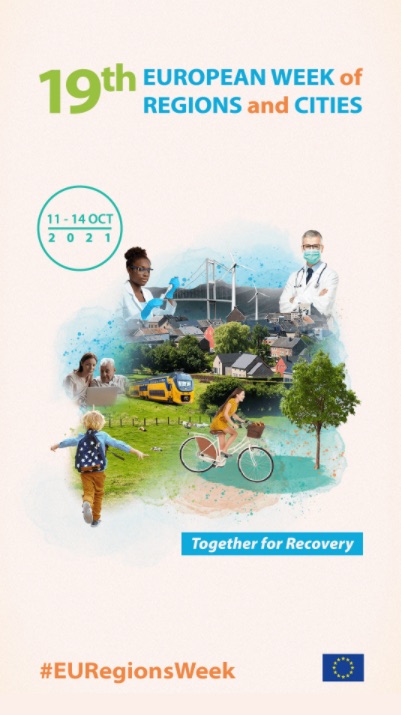
16Sep
19th European Week of Regions and Cities
Under the framework of 19th European Week of Regions and Cities, ICHEC C-SHIP program, the Metropolitan Research Institute, the Institute for Research on Innovation and Services for Development IRISS-CNR, and the European Research Executive Agency of the European Commission kindly invites you to their joint workshop: Collaborative heritage ecosystems in post-pandemic EU. The workshop will take place on Tuesday 12 October 2021 from 11:30 to 13:00.
Visit the official website for registering https://eu.app.swapcard.com/event/eu-regions-week/planning/UGxhbm5pbmdfNjMxMjk0
Collaborative heritage ecosystems in post-pandemic EU: workshop summary
The workshop seeks to understand local heritage ecosystems through the lens of adaptive reuse processes. It sheds light on how they can provide space for collaboration, engagement and bottom-up driven regeneration. Relying on the experiences of the Horizon 2020 CLIC & OpenHeritage projects, the role of heritage ecosystems is discussed in the post-pandemic environment, focusing on two interrelated aspects: Different strategies of building and maintaining them & their relationship with local business networks & heritage innovation.
Detailed description
Innovation Ecosystems are locally embedded networks that enable individual organizations to join forces & complement each other by moving resources & capacities more efficiently according to emerging needs. They are particularly appropriate tools to support local initiatives, react to local challenges & find solutions to locally specific problems. The post-pandemic situation presents a rare opportunity of rebuilding, allowing the support of a more bottom-up driven and eco-conscious development through strengthening these innovation ecosystems connected to local cultural heritage.
The workshop will engage in a deeper exploration of the topic through combining case-based & academic approaches in the three break-out rooms. Through diverse cases of cultural heritage adaptive reuse from the OpenHeritage and CLIC projects, local processes and possible innovation eco-system-based recovery trajectories are discussed, while a more academic line of inquiry is introduced in a third breakout room, exploring resilient business & governance models in this context.
Format: Workshop (plenary, break-out rooms, plenary)
Date: Tuesday 12 October 2021 from 11:30 to 13:00 (90 minutes)
Place: ON-LINE (Zoom & Slido)
Organizers: ICHEC Brussels Management School (Belgium), Metropolitan Research Institute (Hungary), Institute for Research on Innovation and Services for Development IRISS-CNR (Italy), the event is co-organized with the European Research Executive Agency of the European Commission
Collaborative heritage ecosystems in post-pandemic EU: planned agenda
Plenary 11:30-12:10 (40-minutes)
Moderator: dr. Ugo GUARNACCI (European Research Executive Agency of the EC)
Topic one: The role of heritage ecosystems in the post-pandemic environment
Speaker: Celine FABREQUETTE, ECOLISE, Brussels, Belgium
Topic two: Local business networks and heritage innovation networks
Speaker: Prof. dr. Pierluigi SACCO, IULM, Milan, Italy
Topic three: Heritage multidimensional productivity to build new circular cities
A conversation with Joke QUINTENS, Wetopia, Marseille, France and Kevin KIMWELLE,
Port Elizabeth, Eastern Cape, South Africa
Break-out rooms 12:10-12:40 (30 minutes)
Topic one: The role of heritage ecosystems in the post-pandemic environment
Moderator: dr. Hanna SZEMZŐ, Metropolitan Research Institute (Hungary)
The post-pandemic environment offers a unique opportunity to rethink how the engagement of local communities can be used as an engine of redevelopment, connecting various actors, and supporting a balanced and inclusive recovery. The break-out session focuses on 3 different cases as a point of departure and examines how neighborhood level governance structures can work in achieving sustainability. Then it discusses the added value of heritage and heritage communities in this context, focusing on their role in the neighborhood life.
Topic two: Local business networks and heritage innovation networks
Moderator: dr. Ruba SALEH, ICHEC Brussels Management School (Belgium)
Although all sectors were hit by COVID-19 pandemic, the cultural and creative industries were among those hardly hit. This breakout room aims to discuss how exemplary adaptive reuse practices co-created and delivered value together with the local ecosystem during the pandemic. This breakout room aims also to reflect on the processes and procedures put in place to act collectively for improving the quality of the built environment while paying attention to the societal impacts.
Topic three: Heritage multidimensional productivity to build new circular cities
Moderator: dr. Antonia GRAVAGNUOLO, Institute for Research on Innovation and services for Development IRISS-CNR (Italy)
This session aims to explore how cultural heritage (adaptive reuse) can have a key role in post-pandemic circular cities by triggering a multidimensional productivity (ecological, social and cultural) that can in turn enhance communities’ wellbeing and health, nature regeneration and resilient local economies. Cultural heritage can thus become a hub of circular innovation and entrepreneurship, generating positive social impacts engaging communities in cultural co-production, manufacturing, craft, arts, research, education, reuse & repair activities, as well as digital innovation. Relevant experiences are discussed that represent examples of how this can be realized: DeCeuvel in Amsterdam, Xwhy creative placemaking in Lithuania, Smart Rural Living Lab in Portugal, the FabLabs / Fab City network.
Plenary 12:40-13:00 (20 minutes)
Moderator: dr. Ugo GUARNACCI (European Research Executive Agency of the EC)
The moderator of each break-out room will report back to the plenary.
